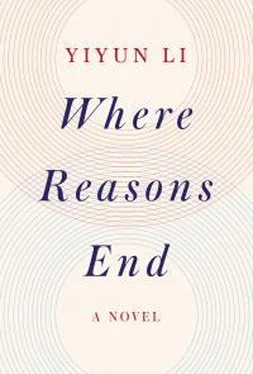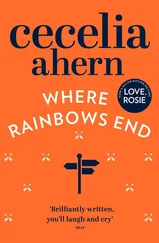Does one have to stay out of part of one’s own mind? I asked.
If you don’t want to be out of your mind entirely, he said.
Do you stay clear from where you shouldn’t be in your mind?
Do you mean: Do I, or did I?
It makes no difference, I said.
If I’m the trespasser of my own mind I’ve acquitted myself, he said.
Then I shall acquit myself, too.
Don’t trespass in the first place, he said.
Too late, I said. To love is to trespass.
To live, too, he said. How can anyone not see it that way?
4
Then the Button Came Undone
Why, you’ve been quiet, Nikolai said.
I had been. I couldn’t find words just yet.
Bad day? he said.
I realized then that not all rules of this world were clear to me. Did he go everywhere I went, see everything I saw?
Not really, he said. Not always.
Even omniscience is limited, I thought. So your ability to read my thoughts doesn’t extend to the ability to see the physical world I traverse, I said.
It depends.
On what?
My mood.
Where are you when you’re not in the mood to be here? I asked.
Here, which here?
I mean when you’re not in the mood to talk with me, I said.
But that was not precise, either.
That’s not for you to know, he said.
I had just driven past the corner of F—— and M——, where I used to drop him off in the morning. I told him that. By accident, I said. There was a detour I didn’t expect.
Where I last saw you, he said.
That line should be mine, I thought.
Mine, too, he said.
Why, you’re quiet again, he said after a long pause.
Some things are still harder for me than for you, I said.
Like what?
I thought about the eight hours between when I had dropped him off at the intersection and when he had died. Eight hours was a long time. What had happened would always be unknown to me.
Perhaps it’s the least important thing to know? he said.
How many eight hours can be fit into a life? I had known Nikolai for sixteen years and twenty-two days. I had loved him longer. When he was an infant, I had worked in a hospital, and for the duration of the workday, longer than eight hours, he would refuse to take a drop from a bottle, and then would nurse every hour after I got off work, all night long. A six-week-old baby or a sixteen-year-old boy, unyielding to the point of extravagant intrepidity.
Still, I said, here’s eight hours, something you know and I don’t.
I wouldn’t know what happens to your days most of the time, either, he said.
Mine, this, I said, is a different kind of not knowing.
Not knowing is not knowing, he said.
And not knowing must be close to what people call a wound. Along with wound are words like healing and scars. They are all bad analogies, the foundation of wishful thinking. Can one live, I thought, with a conclusion so fatally inconclusive?
The question should be, Does one want to? Nikolai said.
I remembered a story he had worked on in middle school, about a five-year-old boy named Nikolai. Uprooted by the 1917 Revolution, he and his mother fled St. Petersburg, accompanied by his nanny. They dressed him in a new coat, but neither woman talked while waiting for the train to leave the station.
He used to show me a page or two as he had finished them. I had not known what had led him to write the story. Nikolai—the boy in his story, the boy journeying to the unknown—sat in the train car and kept fingering a shiny brass button on his coat. His nanny told him not to do it, while the mother remained silent.
“Then the button came undone, and the coat was no longer new.”
I remembered the chill when I had read the line. I remembered telling him a sentence like that would take him a long way if he decided to become a writer. He was twelve then, not quite trusting my words. He could never write as perfect a sentence as he wanted, he had replied, my admiration making him more dejected.
But it’s true, he said now. Perfection is my only way of living.
Then the button came undone, and the coat was no longer new.
Nikolai—I said—I mean that boy in the story, he’d turn a hundred and five this year.
He’s dead, he said. If that’s not obvious enough.
When did he die? I asked. I had never seen the end of the story.
I didn’t finish it, he said. But I suppose he didn’t live past twelve or thirteen.
It was not the first time a boy had died in his stories. In fourth grade, a school project had led to a note of concern from the teacher, and queries from a few parents I had been friendly with.
They’re only stories, he said. You write stories. You’re making things up even at this moment.
Sometimes what you make up is realer than the real, I thought.
The dictionary would disagree with your statement, he said.
I looked up the word. Real, coming from res, fact, thing, and realis, relating to things.
What you make up is always unreality, he said. Relating to nothings.
Okay, I said.
Don’t be crestfallen because you lost an argument, Nikolai said. Did you see any change there?
Where?
The corner that makes you sad.
A lot more leaves have fallen, I said.
There were already a lot of fallen leaves then.
I did not need him to remind me of that. I had seen them, the leaves on the ground, on a morning that was not yet autumn, and I had seen him hop over a pile, walking away. Since that day I had watched the trees shed their leaves for weeks but it never seemed to come to an end. Only in an O. Henry story does the last leaf take on an existential significance. Only in an O. Henry story does everything come with a poetic and tragic twist. The truth is, leaves are always falling. After a while they all look the same, the ones shuddering in the wind and the ones hurled around before they are cleaned up by blowers and mowers.
Blowers and mowers, Nikolai said. You need to try harder if you want to learn rhyming.
It occurred to me that he was indeed unable to see the physical world where I was. The leaves and the leaf-clearing rituals were abstract to him—he had not lived, since age three, in a place where leaves fell so profusely in one season. What else, which would have been merely new, became otherworldly to him? Snow and snow days, icicles under the eaves, crocuses that we had planned to plant together blooming in February, a cardinal knocking on the window with his head and beak—was it fondness or animosity toward its own reflection that made the red bird persist? Nikolai had only seen Steller’s jays near our old house. They were confident birds, loud, territorial, always at war with the squirrels.
Since when have you begun to talk about nature? Nikolai asked. And all those small things.
Where else can one turn to but nature if one needs endless details to sustain oneself, I thought. Nature is not small, I said.
You weren’t that interested in it.
I knew he had a point. The land I had traveled: The more intangible it is, the less hindered one feels, and the more invisible.
Still, I said, I’ve paid attention.
Attention out of disinterest or indifference, he said, is worse than inattention.
Touché, I said.
You’re bad at looking and seeing, he said.
Looking, yes, I said. But seeing? There must be a difference between those two. Some people can look and look and look and look without seeing anything.
But you’re claiming the opposite: seeing without having to look.
I thought about it. Just the day before I had seen a flock of birds take off from an open field to an overcast northern sky. Had I seen the scene before? Multiple times. I even had a photo, a silver gelatin print, given to me by a photographer. I had her book, too, with the same image on the cover, a flock of starlings transfixed in flight. I had seen them all, the birds, the sky, the field, the clouds, the utility poles, but I had not made any effort looking.
Читать дальше












